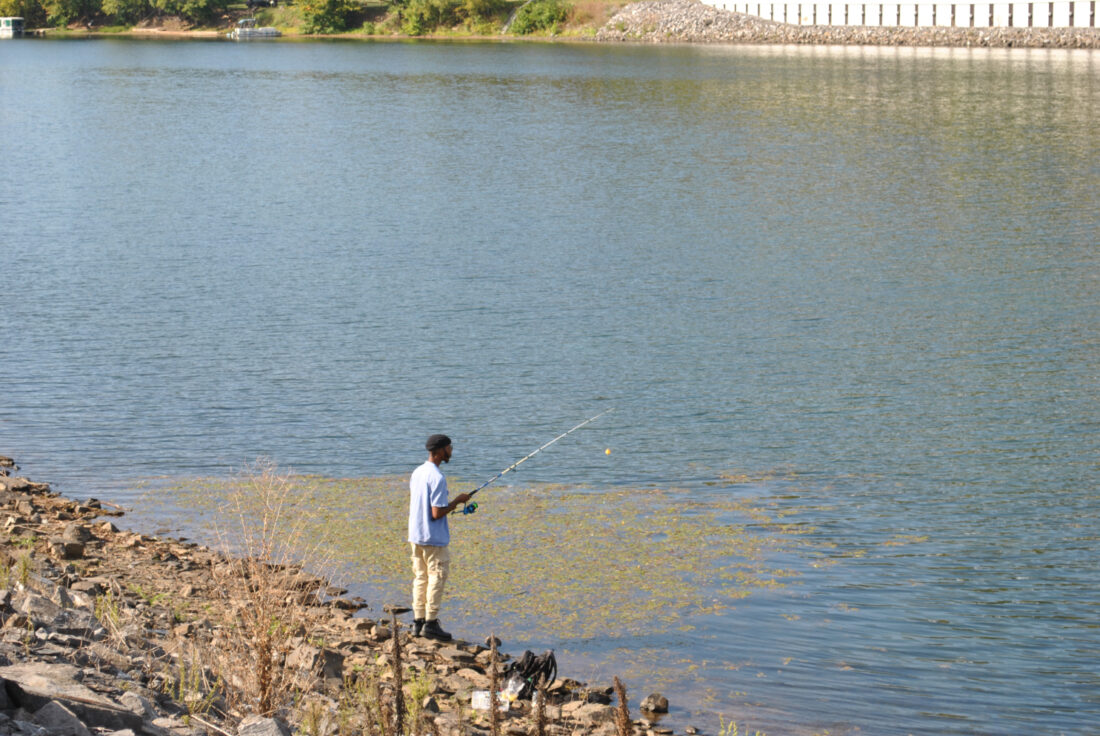Water levels near drought locally; City encourages customers to conserve water

HUNTER SMITH/THE EXPRESS A man fishes in the Susquehanna River at Lock Haven.
LOCK HAVEN — With rainfall nowhere near the levels necessary, Lock Haven and surrounding areas are beginning to near drought levels.
With this in mind, the City of Lock Haven are asking its residents and customers to conserve water.
Though the water levels at the two city-owned reservoirs — Ohl Reservoir in Greene Township and Keller Reservoir in Wayne Township — aren’t at dangerous levels, City Manager Gregory Wilson told The Express the city doesn’t want to wait until the last minute.
“While there are still several months of water on-hand, we don’t want to wait until the last minute to talk to residents and especially businesses and industries about taking steps to reduce water consumption. As you look at the forecast, there are only a couple days that have rain predicted,” Wilson said. “The reservoirs, of course, the great collectors of rainwater, that is then treated and sustains our homes and enables businesses and industrial operations from McElhattan all the way up Route 64.”
According to Wilson, Ohl — which is upstream from Keller — has a normal pool elevation of about 1,665 feet (575,708,902 gallons). Due to a lack of rain, it is down 2.6 feet from its normal elevation (462,717,999 gallons on hand).
For Keller, its normal elevation is 908 feet (92,400,000 gallons). Currently, it’s slightly above its normal levels at 94,039,092 gallons.
In light of current conditions, and lack of significant rainfall expected in the future, the city took to social media this week to encourage residents to conserve water, and offered tips on how to do so. Those tips include:
EFFICIENT SHOWERS
A typical shower uses 5-10 gallons of water per minute. Limit your showers to the time it takes to soap up, wash down and rinse off. That means don’t waste water waiting for it to warm up.
DON’T LEAVE WATER RUNNING
Before brushing your teeth, wet your brush and fill a glass for rinsing your mouth. Rinse veggies in a bowl or sink filled with clean water. Stack washed dishes in the sink and rinse all at once.
REUSE GLASSES
Cut down on the number of dishes to wash. Keep a designated bottle or glass throughout the day to cut down the number of glasses to wash. Keep a bottle in the fridge to avoid running tap water until it’s cold.
REPAIR LEAKS
Leaks waste water 24 hours a day. Check all faucets inside and outside your home. Most leaks can be fixed with an inexpensive washer. Add food coloring to the tank of your toilet — if the coloring comes into the bowl without flushing, you may be wasting more than 100 gallons a day.
WASH WISELY
Fill your dishwasher and washer before running. Every time you run your dishwasher, you use about 25 gallons of water. Your automatic washer uses 30-35 gallons per cycle. Run them with full loads and buy energy efficient appliances when you can.
Wilson noted these tips are important for water customers year-round, not just during potential drought conditions.
“The most important thing to remember is that conservation is something that should always be on a customer’s mind because their use of water is billed by the gallon,” he said. “The more you use, the higher your bill will be. So, conserving water has a direct impact on your pocketbook by lowering your water and sewer bills.”

